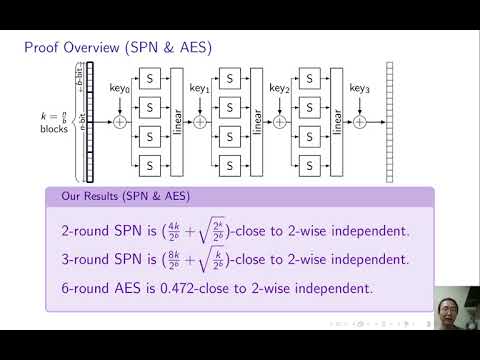CryptoDB
The $t$-wise Independence of Substitution-Permutation Networks
| Authors: |
|
|---|---|
| Download: |
|
| Presentation: | Slides |
| Conference: | CRYPTO 2021 |
| Abstract: | Block ciphers such as the Advanced Encryption Standard (Rijndael) are used extensively in practice, yet our understanding of their security continues to be highly incomplete. This paper promotes and continues a research program aimed at {\em proving} the security of block ciphers against important and well-studied classes of attacks. In particular, we initiate the study of (almost) $t$-wise independence of concrete block-cipher construction paradigms such as substitution-permutation networks and key-alternating ciphers. Sufficiently strong (almost) pairwise independence already suffices to resist (truncated) differential attacks and linear cryptanalysis, and hence this is a relevant and meaningful target. Our results are two-fold. Our first result concerns substitution-permutation networks (SPNs) that model ciphers such as AES. We prove the almost pairwise-independence of an SPN instantiated with concrete S-boxes together with an appropriate linear mixing layer, given sufficiently many rounds and independent sub-keys. Our proof relies on a {\em characterization} of S-box computation on input differences in terms of sampling output differences from certain subspaces, and a new randomness extraction lemma (which we prove with Fourier-analytic techniques) that establishes when such sampling yields uniformity. We use our techniques in particular to prove almost pairwise-independence for sufficiently many rounds of both the AES block cipher (which uses a variant of the patched inverse function $x \mapsto x^{-1}$ as the $S$-box) and the MiMC block cipher (which uses the cubing function $x \mapsto x^3$ as the $S$-box), assuming independent sub-keys. Secondly, we show that instantiating a key-alternating cipher (which can be thought of as a degenerate case of SPNs) with most permutations gives us (almost) $t$-wise independence in $t + o(t)$ rounds. In order to do this, we use the probabilistic method to develop two new lemmas, an {\em independence-amplification lemma} and a {\em distance amplification lemma}, that allow us to reason about the evolution of key-alternating ciphers. |
Video from CRYPTO 2021
BibTeX
@inproceedings{crypto-2021-31232,
title={The $t$-wise Independence of Substitution-Permutation Networks},
publisher={Springer-Verlag},
doi={10.1007/978-3-030-84259-8_16},
author={Tianren Liu and Stefano Tessaro and Vinod Vaikuntanathan},
year=2021
}

